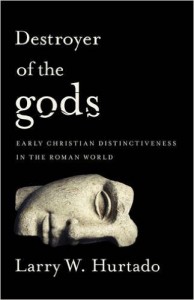
I somehow can’t get away from singing the praises of Larry Hurtado’s newest book, Destroyer of the gods: Early Christian Distinctiveness in the Roman World. It really is a phenomenal book. Hurtado has also been writing about some of the subject material on his own blog.
His most recent post, “When Christians Were Atheists,” is great and talks about the fact that the early Christians were viewed as “atheists” by the pagan culture that surrounded them. Of course they weren’t atheists in the modern sense of the word, but they were “atheists” in the sense that they refused to worship the gods and goddesses who were thought to uphold the larger social and sacral order of Roman culture and empire. To refuse to worship these deities was tantamount to treason because it meant that you refused to take part in the rituals necessary for the safety and prosperity of the empire. Even worse, the early Christians worshipped one, transcendent God to whom all allegiance belonged. When they proclaimed that Jesus was (and is) Lord, implicitly it meant (and means) that Caesar was not. Here is a quote from Hurtado:
To appreciate what this rejection of the traditional gods meant, we also have to understand that gods and reverencing them were woven through every aspect of life. Families had household deities. Cities had their guardian gods. The Roman Empire at large rested upon the gods, such as the goddess Roma. Practically any social occasion, such as a dinner, included an expression of reverence for a given deity. Meetings of guilds, such as fishers, bakers, or others, all included acknowledging their appropriate god.
So, to refuse to join in worshiping any of these deities in a thorough-going manner was a very radical move, and a risky one too, with wide-ranging social costs. People understandably took offense, and Christians could be in for a good deal of anger and hostility that might include verbal and physical abuse. In some cases, the Christian rejection of the gods led to arraignment before Roman magistrates, resulting in punishments, even executions. By the third century, there were occasional spasms of imperial persecution against Christians that could include confiscation of possessions and death sentences. And from at least the late second century, there were full-scale literary attacks on Christianity, the one most well-known today by the pagan writer Celsus.
The whole post is well worth your time to read. And after you read it go read the book.












